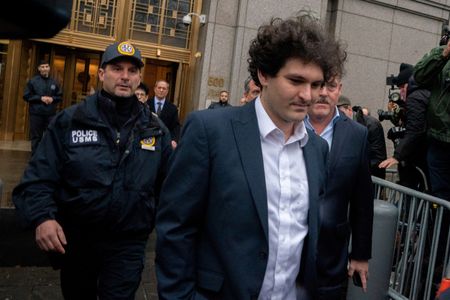By Dietrich Knauth
(Reuters) -FTX’s lawyers on Monday strongly urged a U.S. bankruptcy judge in Delaware not to greenlight a court-supervised investigation into its collapse, saying it would waste time and money and could pose a security risk.
FTX attorney James Bromley at Monday’s hearing told U.S. Bankruptcy Judge John Dorsey, who is overseeing the crypto exchange’s Chapter 11 case, that the proposed review the U.S. Department of Justice’s bankruptcy watchdog is seeking is so vague that it is essentially asking for an examiner to look at “everything, everywhere, all at once.”
The U.S. Trustee has asked Dorsey, to appoint an independent examiner to investigate allegations of fraud, misconduct, and mismanagement that are “too important to be left to an internal investigation.”
Juliet Sarkessian, an attorney for the U.S. Trustee, argued such an investigation is mandatory under federal law in large bankruptcy cases where DOJ or a creditor requests one.
Dorsey, who said he believed an examiner was not required, but should be appointed if “appropriate,” did not rule on Monday. He asked FTX, its creditors and the U.S. Trustee to try to reach an agreement on the scope of a potential examiner review.
FTX said an examiner would merely duplicate work already being done by FTX, its creditors, and law enforcement agencies, adding cost and delay to its effort to repay customers in bankruptcy.
FTX’s new CEO, John Ray, said on Monday that FTX has already answered 156 requests for information from federal prosecutors in Manhattan, producing 70,000 documents, as well as hundreds of requests from other U.S. regulators and prosecutors, members of Congress and foreign governments.
Ray, who worked with court-appointed examiners while leading Enron Corp and Residential Capital through bankruptcy, told the court that examiners in those cases cost $90 million and $100 million, respectively, but were not useful.
“They were very shallow – sort of a mile wide and inch deep,” Ray said of reports produced by the Enron examiner.
Ray also said the FTX database is very sensitive, and he is reluctant to grant additional outside access, given the cybersecurity risks that FTX faced at the start of its bankruptcy.
“You literally could hit the wrong key in this environment and destroy hundreds of millions of dollars worth of value,” he said.
FTX, once among the world’s top crypto exchanges, shook the sector in November by filing for bankruptcy, leaving an estimated 9 million customers and investors facing losses in the billions of dollars.
FTX’s founder Sam Bankman-Fried, who has been accused of stealing billions of dollars from FTX customers to pay debts incurred by his Alameda Research hedge fund, has pleaded not guilty to fraud charges. Several former top executives, including Alameda Research CEO Caroline Ellison, have pleaded guilty to fraud.
FTX’s official creditors’ committee and the liquidators for FTX’s Bahamian company FTX Digital Markets both sided with FTX, saying the proposed investigation is redundant.
“We’re all standing around right now in a building that has burned to the ground and two of the three principals in the company have pleaded guilty to arson,” said Chris Shore, an attorney for the Bahamian liquidators. “Do we really need to spend $100 million for an examiner to come in and say, uh, the building burned down?”
State securities regulators in Texas, Vermont and Wisconsin supported the Justice Department’s bid, saying a neutral report would benefit creditors and customers.
(Reporting by Dietrich Knauth; Editing by Alexia Garamfalvi, Daniel Wallis and Nick Zieminski)

